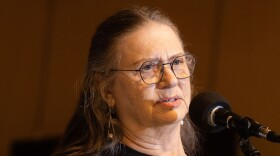The internment of Americans with Japanese ancestry during World War II is part of this nation’s dark history of racial discrimination. These stories have often been hidden, both by the country that committed the injustices and the people who were forced to endure them.
Although Shirley Ann Higuchi knew her parents had been incarcerated at the Heart Mountain Internment Camp in Wyoming, they didn’t talk much about it. It wasn’t until her mother passed away that Higuchi learned just how much the camp had impacted her mother’s life and its enduring legacy in her community.

Higuchi’s journey learning her own history and that of her community is detailed in her new book, “Setsuko's Secret: Heart Mountain and the Legacy of the Japanese American Incarceration.”
“With my mother and my father not really talking about it much and then growing up in Ann Arbor, Michigan, which is a predominantly white and, in some instances, African-American community, I really didn’t have a lot of exposure to other Japanese Americans,” says Higuchi.
With history books omitting much of Japanese internment, for many years Higuchi didn’t know much about it or its significance to her family. So, she was surprised when on her death bed, her mother said that she wanted to dedicate money to the Heart Mountain Foundation, an organization that preserves the site and tells the stories of those held in the camp.
“It really makes you realize as a daughter of a former prisoner this is something that was really, really important to her, even though she never talked about it,” Higuchi says.
The book starts and ends with Higuchi meeting people who knew her mother before, during, and after the war and learning about what her experience was like.
One of the people who was with Higuchi’s mother at the camp was Kathy Saito Yuille, Higuchi’s aunt. Yuille doesn’t remember anything from the camp, as she was one of 556 children born there. But her life has been shaped by internment.
“I saw my parents after camp, now this I do recall very vividly, and including my siblings and of course Setsuko, Shirley’s mother — it wasn’t easy to come out of camp and to find work,” says Yuille.
Her father, who had owned a business before internment, had to get a job as a busboy once they got out.
He eventually made enough to start another business, but had to work hard to rebuild. That meant Yuille was raised more by her older siblings than her parents. She says this experience is captured in Higuchi’s book.
Higuchi wants the book to be part of a greater teaching and remembering of what really happened to Japanese people during internment.
“The best remedy against racism and illegal acts is education,” Higuchi says.







